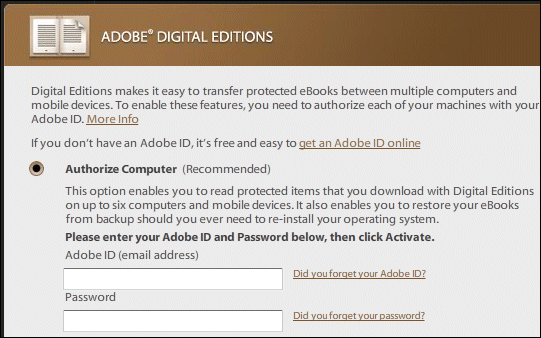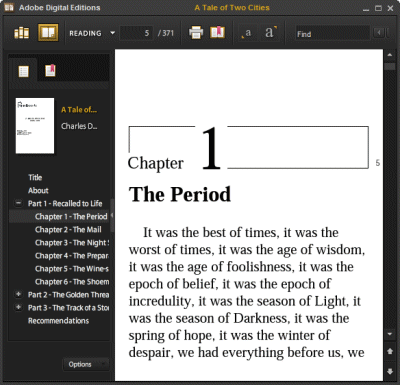Someone considering a Sony Reader from Waterstones (a UK bookseller) asked me what I thought.
I haven’t tried the Sony Reader yet – it would be an interesting thing to review and I’ve heard good reports of its usability and readability. The snag for me would be that I’m already device-laden when out and about, and the last thing I want is yet another one. In principle, I’d rather use a multifunctional device – the iPhone is apparently good for reading, or maybe a laptop or netbook. Battery life is an issue on laptops, but I can usually plug in on the train now.
But I digress. What about the content, is an epub from Waterstones a good buy? I took at look at the site. Waterstones has done a deal with Sony and gives the impression that you must buy a Reader (£224) in order to purchase and read its ebooks, though as far as I can tell you can read them on a PC or Mac without buying a Reader. The help page is a model of unclarity. It presumes I already have a Reader. Then it says I have to install Adobe Digital Editions and sign up for an Adobe ID. It seems rather convoluted, that to buy a book from WaterStones and read it on a Sony I have to sign up with Adobe.
It is all about DRM of course. I took at a look at Adobe Digital Editions. This is the software for reading an epub protected with DRM delivered by Adobe Content Server 4, which I presume is what Waterstones is using. I installed it and saw dialogs just like the ones I remember from the failed Microsoft Reader and its lit format:

I can “activate” up to six devices on which to read my ebooks. A few other things caught my eye. System requirements show Windows and Mac but not Linux. The faq says Digital Editions does not connect behind ISA server – that would hit me, as I use ISA, the Microsoft firewall – and explains bad scenarios. For example, if you don’t authorize your computer, maybe because you don’t want to give your personal details to Adobe, the books are locked forever to that one computer. I presume you couldn’t even transfer them to a Sony Reader.
Surprisingly, the faq says that the only supported device is Sony Reader PRS-505, though it adds:
Adobe is actively working to support other platforms and devices. Further developments will be announced when available.
No iPhone (Stanza). No Amazon Kindle. Won’t work on my Windows Mobile devices, or any phone as far as I can tell.
The reader itself worked fine. I downloaded a free book from Feedbooks and added it to the library – no DRM, phew.

As for Watersones ebooks, right now, there are several things to dislike. First, if I’m going to buy an ebook, I do want to be able to read it across all my devices – a specialist reader has its place, but other mobile devices are also important. I wouldn’t consider it without that. Second, the DRM is a nuisance. Third, the prices strike me as too high. For example, I can buy John Le Carre’s A Most Wanted Man for £13.99, which Waterstones tells me is a discount of £5.70 from the list price of £18.99. However, the same book is on offer in hardback for £12.50. So I am paying a premium to get the ebook.
Software books definitely have advantages. They are weightless, green, searchable, you can vary the type size. However they have disadvantages too. You need a device to read them; you can’t sell them on; you have no physical backup; there is no smart cover; and you don’t get the sensual pleasure of turning over crisp new pages. Further, the publisher is saving manufacturing cost, and the retailer is saving storage and carriage costs: shouldn’t those savings be passed on?
These factors, combined with the DRM nuisance and the format wars, would make me cautious about investing in Waterstones ebooks at the moment.
There is a political aspect to all this. Amazon is expected to launch Kindle in the UK at some point. It needs wireless support for direct content download, which may be holding it up. However, UK publishers seem solidly behind epub and Sony/Adobe. The Bookseller observes:
There may be a collective strategy about this: no-one—least of all Penguin, HarperCollins, Hachette, Macmillan or Random House—wants to see Amazon in possession of the dominant e-book device, and by consequence become the only e-book retailer.
Of course the publishers can support multiple formats. My guess is that Amazon will be a significant player with Kindle, even though it is late arriving.